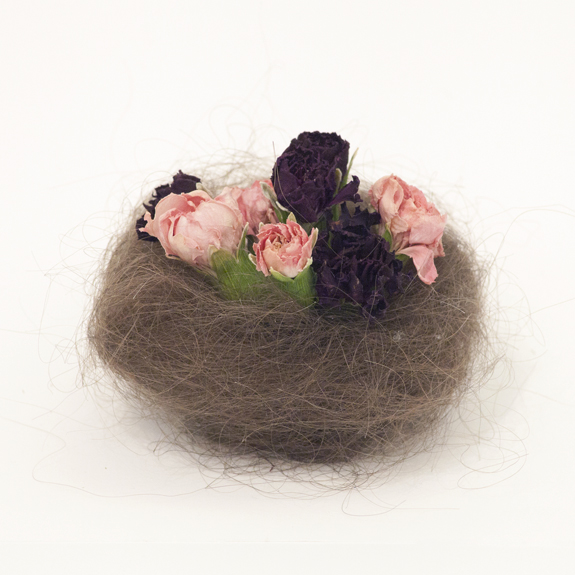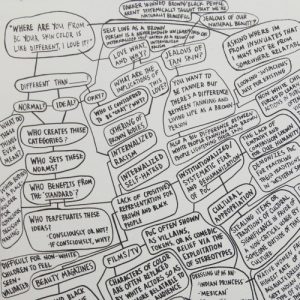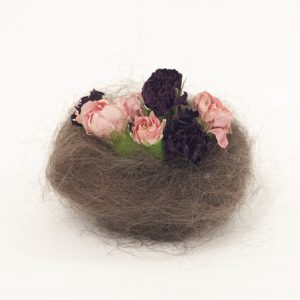by Brenda Guesnet
For this month’s SPARKArtists we talked to Patricia Alvarado, a 22-year old visual artist from Chicago finishing up art school at the Minneapolis College of Art and Design. Although Patricia is mainly a performance artist, she uses a variety of mediums, including video and photography. Her work draws on personal experience as well as research to explore the violence and the absurdity of white patriarchal standards and how they affect us, especially women of color.
Do you have something you’re working on right now that you can tell me about?
A: I’m working on a few different things; right now I’m working on my senior project because I’m graduating in December.[One is] a performance piece where I take small, innocent “compliments” or things that people have said to me, and then deconstruct them to show the [racist] complexities within them. [So it’s] kind of like a “think tree” where you have the point and then stems coming off of it, kind of like a brainstorm. It’s taking something small that maybe someone didn’t really mean as super offensive, and then mapping out and branching off of that to explain the complexities within those statements and why we need to be careful of what we’re saying. It’s me writing this on the wall, and it branches out really big and it’s something that can go on for a really long time if needed and given the time opportunity. I’ll be contrasting that with these objects that describe how exhausting that is – because that’s my whole life on a daily basis, hearing these things, and because I have the knowledge and the experiences that I do, my brain is constantly doing this [mapping] and it’s exhausting. So [I’ll be] contrasting this big mind map with objects that kind of are more easily enterable. As a viewer if you see so much text it’s hard to process it at first, so the objects serve as an entering point for someone who isn’t easily going to be like “oh yeah, racism.”
And it’s going to be a performance?
Yeah, it’s a live performance so the objects will be there, but I will be present writing on the wall so people can interact with me if they want. I actually don’t know how that’s going to work out yet, if I’m going to be talking to people or not while I’m doing this.
Looking at the work you have up on your website, I noticed how you come back a lot to the theme of body hair.
Yeah, that’s something that I worked on when I was just starting to get into making political art. I used to be a photo major and then I studied in NY for six months for a residency. At that time I was feeling really unfulfilled by my photo work. I was reading a lot of theory on photography, and it wasn’t matching up with my practice and so I was freaking out, I was like “what am I doing, this doesn’t make any sense, I don’t like the work I’m making, it’s stupid. And I was thinking a lot about feminism at the time as well, reading about feminism on Tumblr, and I was like “yeah, these are really important things”. And when I was in NY was when I started talking to my friend who is also an artist, Amaryllis [DeJesus Moleski], and she is a queer woman of color. We had a lot of conversations about what it’s like to be a queer woman of color, especially in art school and academia. That’s when my work really switched and I was able to start making the work I’m making now. Body hair was kind of an easy start, because it was something that was just present and I was thinking about and reading about, so I started making work about it.
I feel like you are always super present in your own works, also as a performance artist, your body is literally in the work. Is that something that comes natural to you or is it also really confronting to expose yourself so much?
I would say both. I feel like I’m always really present in my work because most of my work is about my experiences. It’s also really important to me to create some kind of visual representation for other brown women. Not that I ever think that I can speak to everyone’s experiences, because I can’t, I can only speak to mine. But I hope that people can relate and feel like I’m speaking to them because I am. I’m here for people to relate to, I’m here to talk about things that I’ve been through, so that other people can feel like they’re not alone. I’ve gone through these things too and I want to talk about them. My practice is a lot about creating dialogue and facilitating discussion. It’s weird to be so present in so much of my work, like every time I hang a show I feel like it’s just like a hallway of me [laughs]. But I think it’s helpful for me to process things that I go through and to learn more about myself.
It’s so much about representation, and whose life experience is represented in the art that is shown to us.
Yeah, my friend Amaryllis who I mentioned, we all had our own studios in this residency that we did, but before mid-semester critique, I really [hadn’t seen] any of the work she was making. I walked into her studio, and she was making these giant drawings and paintings of queer women of color, and I looked at these drawings and I literally just started crying. I was like, I’ve never seen this kind of beautiful representation before, and I was like holy shit, this is what people are lacking, because I had never seen this before. So this is what I want, and this is what I want to communicate to anyone who is looking at my work too, is that I’m out here, struggling, just like everybody else, and I want to create this space for people to feel like I’m talking to them.
Right, and I think often the art world reproduces this lack of representation so violently by pretending that it’s this separate space that has nothing to do with structures of sexism and racism. Do you experience that as well in art school? How do you fight back?
Yeah, I experience this a lot. I go to school in the Midwest so the majority of people at my school are white, and it’s really hard all the time. I would say that 90% of my critiques are me defending things that I think are really simple, like that racism exists. It gets really tiring but I try to view it as practice, because I know I’m going to have to deal with this for the rest of my life – dealing with really simple-minded questions and defending things that I believe in. But it’s really hard, we don’t have a lot of people of color as teachers, so I’ve had to work really hard to find people to talk to about my work. Critiques are always really awkward, and it’s gotten to the point where I have to go into critiques on the defensive because I can pretty much anticipate the conversation, which is really sad. And not to completely knock my school, because I’ve learned a lot, everything I know is because of my education. But it’s hard to find good conversation and I guess it’s made me really tired, which is why I’m making the work that I’m making right now, because I’m honestly exhausted from all of this. Every critique is a toll, and every work I make is a toll on me. Even when I’m in class and someone says something and I’m like “hold up” and I go off about patriarchy or racism or whatever, and I can see people [thinking] “oh my god, here’s Patricia, she never shuts up about this.” Which is fine, because the thing for me is that if I don’t say anything, there is a very real tangible possibility that white people in the room can go for their entire lives without acknowledging [racism]. That’s real to me, that people can really just go through their lives and not think about this. And I have to go through my life and think about this literally like every moment of my day. I just feel a moral responsibility to be that person, and if people don’t like me for it, it’s fine with me at this point. It’s a struggle all the time but I’ve found good support systems, which has been really helpful. I’m just always trying to do the right thing and defend brown and black people as much as I can, and try to keep pushing through it.
Do you feel nervous about the future because of what you’re facing at art school now?
I feel okay about it. I’ve gotten so many opportunities to show my work and to talk about these things, especially this year. This year has been really amazing. I’ve shown a few different times and I’ve done interviews, which is really nice because it gives me an opportunity to be like “I’m out here, talking about these things, and making art with a political stance.” So I feel nervous about it, but I feel sort of well prepared, kind of like because of the things I’m dealing with at my school, like I said, I view these things as practice. So I feel relatively prepared. It’s never easy, but I feel more and more ready to deal with it. It’s just practice, everything is practice. Just like unlearning internalized racism is a daily thing, me learning to deal with critiques, etc, is also a daily thing. It’s given me a thick skin.
Who or what are your inspirations?
So my friend Amaryllis is a huge inspiration to me, just because she really is the one who got me starting to think about these things and to look at my life in a more critical way. Props to her, she’s just an amazing human being and a great artist. Then, other women of color who are out here fighting for representation, Fabiola [Ching], who runs the Coalition Zine is a huge inspiration to me because she’s probably one of the most driven people I have ever come across. She’s out here fighting every day, she’s super strong and I love what she does. Also just having discussions is really helpful for me, just talking to other people and having that space to relate, or to feel like I don’t have to explain myself so much. And my family is super supportive of me. Generally just brown and black people who are out here fighting, that’s what drives me the most.
What are your dreams for the future?
I feel like I’ve been asked this so much recently! So I’m planning on staying in Minneapolis for a few years after I graduate; I just want to apply for grants and apply for residencies and stuff. Otherwise I want to go to grad school but I don’t know where yet, so where I move will depend on that. I would love to live in California, but I’ve also lived in New York, so I’d love to go back there too. As far as big plans or dreams go, I would love to teach one day. I don’t know if it would be a studio class or a liberal kind of class? I don’t know, I feel like I could teach something though… And I want to write a book one day. I just want to share positivity and representation, and just continue sharing stuff with people, and reach out to people.




